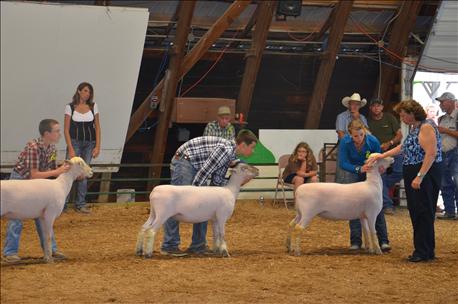
This column should carry a disclaimer: "What you’re about to read may upset you — it may even offend you." Sometimes there’s value in telling things the way they are.
There was a time in agriculture when a handshake was as good as a notarized document. Once upon a time, farmers bought from the same suppliers year after year if they got good service, even if they could save a few dollars somewhere else. And this may have only happened in never-never land, but we would like to think that in the early days of 4-H and FFA, there was no cheating or conniving.

LET KIDS COMPETE: Isn’t it about time parents left preparing and showing animals to the 4-H’ers, and refrained from enhancing an animal through unethical means?
Whatever the way things used to be, they seem different today. When it comes to ethics, morality and loyalty, it’s easy to argue that society in general has deteriorated. It’s disheartening to think that the same things may happen in Indiana agriculture. Here are situations that give me pause.
An acquaintance bent my ear because he continues to lose farm ground to large operators who pay more cash rent. People will bid different amounts based on their operation — that’s normal. What he objects to is that some stoop to finding lists of landowners at the courthouse and sending mass mailings, offering to pay more rent.
It’s not illegal. Is it ethical? Not in my book.
Free advice
A friend of mine is a highly respected agronomist. He also sells seed, mostly just to keep him in touch with farmers.
Recently a farmer he didn’t know persuaded him to come to his farm. My friend looked at his fields and answered questions for over two hours.
When my friend asked him if he would consider buying a few bags of seed, the farmer’s attitude changed. He told my friend to put the lowest-priced package together, and he would consider it. So far my friend hasn’t heard from him again.
Was the farmer being shrewd and getting free advice from someone he found knowledgeable? Or was he imposing on someone he had no intention of doing business with?
Illegal? Of course not. Ethical? Again, not in the books I read.
Cheat to win
4-H and FFA are great organizations that shape lives and values of young people. Yet sometimes, adults interject their own ethics — or lack of them. That’s when positive learning stops.
Eleven animals tested positive for drugs at the 2016 Indiana State Fair. A grand champion was disqualified when it was discovered that the animal was more than a month too old.
Cheating at livestock shows, even in 4-H, has been an issue for decades, and probably will continue to be for years to come. It’s going to be a hot button this winter in Indiana, as state and county 4-H officials take another stab at cracking down on abusing animals and cheating.
One friend recently told me that if someone wants to win that bad, they ought to spend $30 on cloth and make their own purple banners. I agree.
What’s most disturbing are the values that these parents who condone or even enable cheating are passing on to their kids. It’s a self-perpetuating problem.
Maybe Indiana agriculture was never as pure as in "Once upon a time" fairy tales. But it was certainly bound by higher ethics, morality and loyalty than some exhibit today. It’s time to return to the days of handshakes, fair deals and honest competition. Let’s all do our part to curb these trends before agriculture loses a reputation it can’t reclaim.
About the Author(s)
You May Also Like




